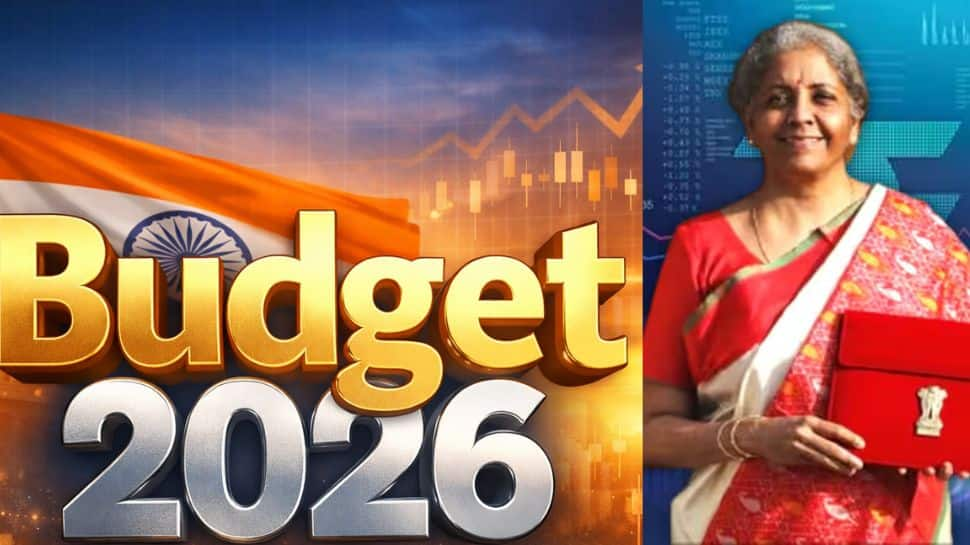Politics
Indian Stocks Dive as Trump Imposes 100% Tariff on Pharma Imports
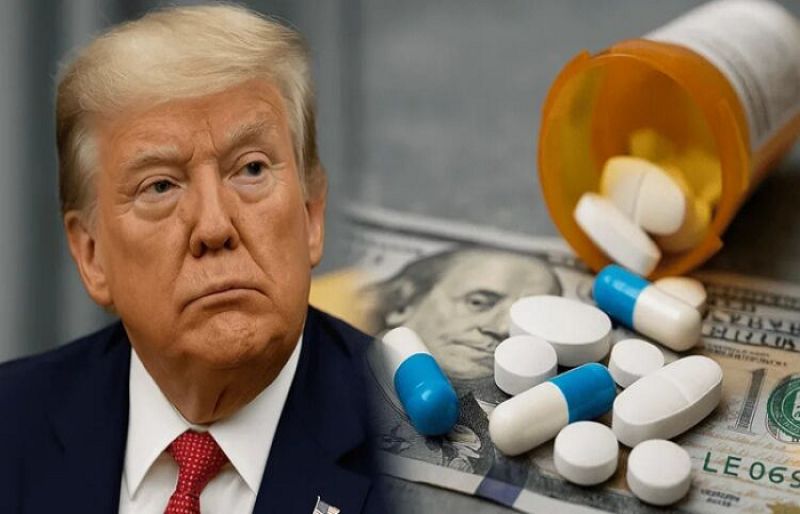
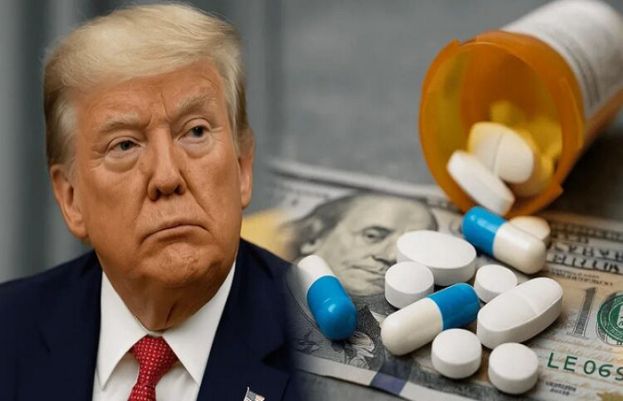
Indian pharmaceutical stocks declined sharply by up to 5% on Friday following US President Donald Trump’s declaration of imposing 100% tariffs on branded and patent-protected medicines including from India.
India’s Sun Pharma experienced the steepest decline, touching its yearly low at Rs1,547, showing a 5% reduction from its last closing price.
Biocon witnessed a 3.3% fall to Rs344, whilst Zydus Lifesciences declined by 2.8%, settling at Rs990.
Aurobindo Pharma decreased by 2.4% to Rs1,070, and Dr Reddy’s registered a 2.3% decline to Rs1,245.30.
Both Lupin and Cipla saw a 2% reduction, ending at Rs1,923.30 and Rs1,480, respectively.
Torrent Pharma showed the smallest decline of 1.5%, reaching Rs3,480.65.
President Trump on Thursday announced tariffs of up to 100 percent on imports of branded and patented pharmaceutical drugs, starting October 1, 2025.
India’s pharmaceuticals sector, one of the most dependent domestic industries on trade with America, was set to be significantly impacted by the move.
“Starting October 1st, 2025, we will be imposing a 100 percent tariff on any branded or patented pharmaceutical product, unless a company is building their pharmaceutical manufacturing plant in America,” the Republican leader said on Truth Social.
Trump’s posts showed that his devotion to tariffs did not end with the trade frameworks and import taxes that were launched in August. A reflection of the president’s confidence that taxes will help reduce the government’s budget deficit while increasing domestic manufacturing.
In his latest tariff blitz, Trump also slapped 50 percent duty on imports of kitchen cabinets and bathroom vanities, 30 percent on upholstered furniture, and 25 percent on heavy trucks.
While Trump did not provide a legal justification for the tariffs, he appeared to stretch the bounds of his role as commander-in-chief by stating that the taxes were needed “for National Security and other reasons.”
America is India’s largest export market for pharmaceutical goods.
In FY 24, of India’s $27.9 billion worth of pharma exports, 31 percent or $8.7 billion (Rs 77,138 crore) went to the US, according to the Pharmaceuticals Export Promotion Council of India, an industry body.
Another $3.7 billion (Rs 32,505 crore) worth of pharma products were exported in just the first half of 2025.
Per reports, India supplies over 45 percent of generic and 15 percent of biosimilar drugs used in the US.
Firms like Dr Reddy’s, Aurobindo Pharma, Zydus Lifesciences, Sun Pharma and Gland Pharma reportedly earn anywhere from 30-50 percent of their total revenues from the American market.
Although the latest American tariffs appear to mainly target branded and patented drugs a segment dominated by multinational giants uncertainty looms over whether complex generics and speciality medicines from India would also be under the scanner.
Moreover, large players already have manufacturing facilities in the US.
American consumers depend on low-cost generics manufactured in India.
Higher tariffs would lead to price hikes, inflation and drug shortages in the country.
Meanwhile, Indian companies, operating on thin margins in the US generics space, may struggle to absorb costs if tariffs are imposed on them, and end up passing them on to US consumers or insurers.
Trump has already slapped 50 percent tariffs on Indian imports, which also includes a 25 percent ‘penalty’ for continued purchase of Russian oil.
Politics
Former South Korean president yoon sentenced to five years in prison
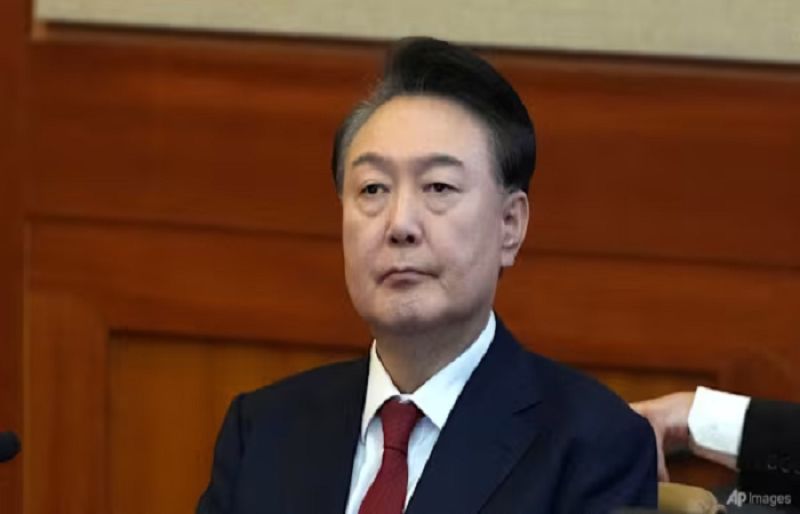

A South Korean court on Friday sentenced former President Yoon Suk Yeol to five years in prison on charges that included obstructing attempts by authorities to arrest him following his failed bid to impose martial law in December 2024.
The Seoul Central District Court found Yoon guilty of mobilising the presidential security service to block authorities from executing an arrest warrant that had been legally issued by a court to investigate him for his martial law declaration.
In televised proceedings, he was also found guilty of charges that included fabricating official documents and failing to comply with the legal process required for martial law.
The ruling is the first related to the criminal charges Yoon faces over his botched martial law declaration.
“The defendant abused his enormous influence as president to prevent the execution of legitimate warrants through officials from the Security Service, which effectively privatised officials … loyal to the Republic of Korea for personal safety and personal gain,” the lead judge on the three-justice panel said.
Speaking outside the court immediately after the decision, one of Yoon’s lawyers, Yoo Jung-hwa, said the former president would appeal the ruling. “We express regret that the decision was made in a politicised manner,” she said.
He could face the death sentence in a separate trial on a charge of masterminding an insurrection by declaring martial law without justification.
Yoon has argued it was within his powers as president to declare martial law and that the action was aimed at sounding the alarm over the obstruction of government by opposition parties.
Yoon, who also denied Friday’s charges, could have faced up to 10 years in jail over the obstruction charges related to when he barricaded himself inside his residential compound in January last year and ordered the security service to block investigators.
He was finally arrested in a second attempt involving more than 3,000 police officers. Yoon’s arrest was the first ever for a sitting president in South Korea.
Parliament, joined by some members of Yoon’s conservative party, voted within hours to overturn his surprise martial law decree and later impeached him, suspending his powers.
He was removed from office in April last year by the Constitutional Court, which ruled he violated the duties of his office.
While Yoon’s bid to impose martial law lasted only about six hours, it sent shockwaves through South Korea, which is Asia’s fourth-largest economy, a key US security ally, and long considered one of the world’s most resilient democracies.
Politics
South Korean ex-leader jailed for 5 years in first martial law verdict
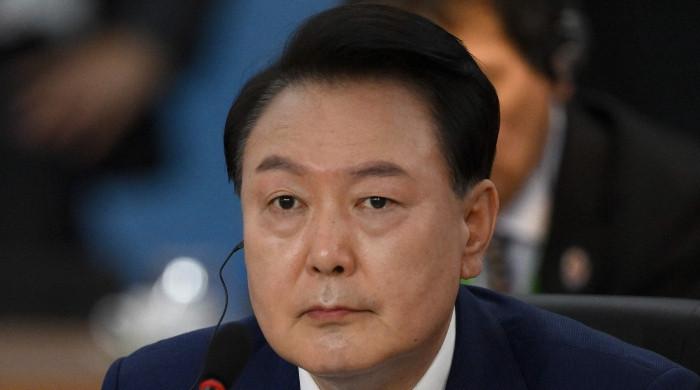
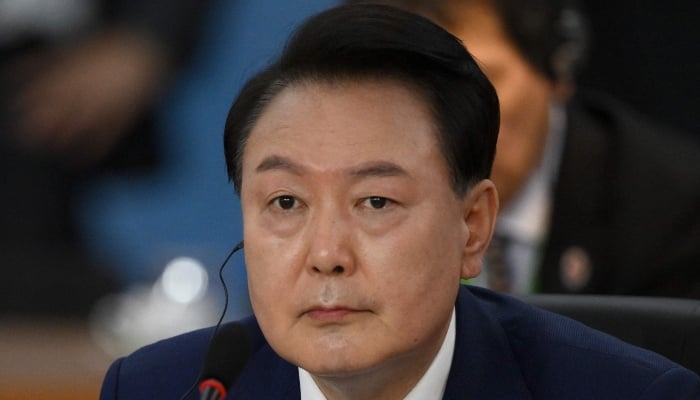
- Judge finds Yoon guilty of obstructing justice and other crimes.
- Separate insurrection verdict is scheduled for February 19.
- Yoon faces another trial over alleged drone flights to North Korea.
SEOUL: A South Korean judge sentenced former president Yoon Suk Yeol on Friday to five years in prison for obstructing justice and other crimes linked to his disastrous martial law declaration and in its chaotic aftermath.
It is the first in a series of verdicts for the disgraced ex-leader, whose brief suspension of civilian rule in South Korea on December 3, 2024 prompted massive protests and a showdown in parliament.
Now ousted from power, he faces multiple trials for actions taken during that debacle and in the turmoil that followed.
On Friday Judge Baek Dae-hyun at Seoul’s Central District Court said he found Yoon guilty of obstruction of justice by blocking investigators from detaining him.
Yoon was also found guilty of excluding cabinet members from a martial law planning meeting.
“Despite having a duty, above all others, to uphold the Constitution and observe the rule of law as president, the defendant instead displayed an attitude that disregarded the… Constitution,” Baek said.
“The defendant’s culpability is extremely grave,” he said.
But Yoon was not guilty of forging official documents due to lack of evidence, the judge said.
Yoon has seven days to appeal, he added.
Prosecutors had called for a 10-year prison term, while Yoon had insisted no law was broken.
Yoon defiant
It comes days after prosecutors in a separate case demanded Yoon be sentenced to death for his role as the “ringleader of an insurrection” in orchestrating the imposition of martial law.
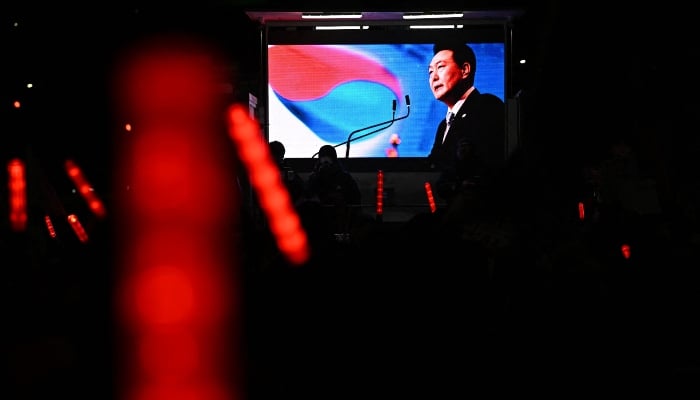
They argued Yoon deserved the severest possible punishment as he had shown “no remorse” for actions that threatened “constitutional order and democracy”.
If he is found guilty it is highly unlikely the sentence will actually be carried out, as South Korea has had an unofficial moratorium on executions since 1997.
Yoon was seen smiling in court as the prosecutors demanded the punishment.
And the former leader and top prosecutor has remained defiant, saying his martial law declaration was a lawful exercise of his presidential authority.
In closing remarks on Tuesday, he insisted the “exercise of a president’s constitutional emergency powers to protect the nation and uphold the constitutional order cannot be deemed an act of insurrection”.
He accused the then-opposition party of having imposed an “unconstitutional dictatorship” through their control of the legislature.
“There was no other option but to awaken the people, who are the sovereign.”
The court is scheduled to rule on the insurrection charges on February 19.
Yoon also faces a separate trial on charges of aiding the enemy, over allegations he ordered drone flights over North Korea to bolster his case for declaring martial law.
Politics
Trump accepts Nobel medal from Venezuelan opposition leader Machado
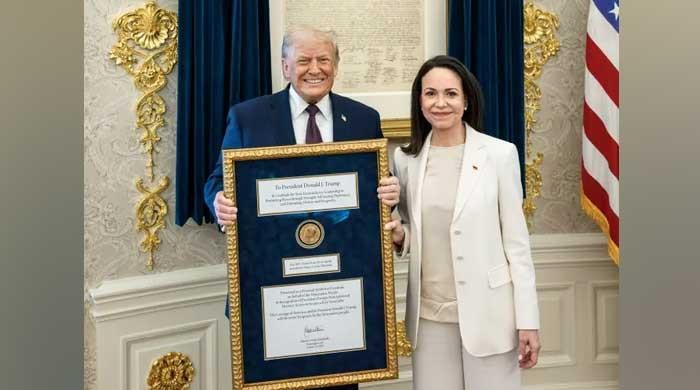
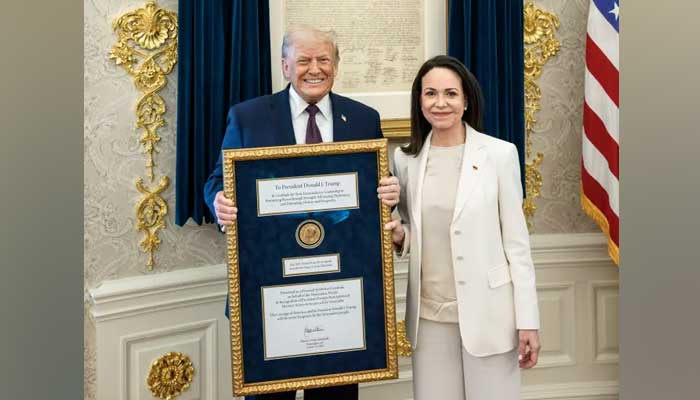
- Machado says meeting was ‘excellent,’ but did not elaborate.
- Encounter comes as Trump has praised Caracas’ interim leader.
- Trump has prioritised securing access to Venezuelan oil.
WASHINGTON: Venezuelan opposition leader Maria Corina Machado gave her Nobel Peace Prize medal to US President Donald Trump on Thursday during a White House meeting, as she tries to gain some influence over how the president shapes the South American country’s political future.
A White House official confirmed that Trump intends to keep the medal.
In a social media post on Thursday evening, Trump wrote: “Maria presented me with her Nobel Peace Prize for the work I have done. Such a wonderful gesture of mutual respect. Thank you Maria!”
Machado, who described the meeting as “excellent,” said the gift was in recognition of what she called his commitment to the freedom of the Venezuelan people.
Machado’s attempt to sway Trump came after he dismissed the idea of installing her as Venezuela’s leader to replace the deposed Nicolas Maduro. Trump openly campaigned for the prize before Machado was awarded it last month and complained bitterly when he was snubbed.
Though Machado gave Trump the gold medal that honorees receive with the prize, the honor remains hers; the Norwegian Nobel Institute has said the prize cannot be transferred, shared or revoked.
Asked on Wednesday if he wanted Machado to give him the prize, Trump told Reuters: “No, I didn’t say that. She won the Nobel Peace Prize.”
The Republican president long expressed interest in winning the prize and has at times linked it to diplomatic achievements.
The lunch meeting, which appeared to last slightly over an hour, marked the first time the two have met in person. Machado then met with more than a dozen senators, both Republican and Democratic, on Capitol Hill, where she has generally found more enthusiastic allies.
While the visit was ongoing, White House press secretary Karoline Leavitt said Trump had been looking forward to meeting Machado, but that he stood by his “realistic” assessment that she did not currently have the support needed to lead the country in the short term.
Machado, who fled Venezuela in a daring seaborne escape in December, is competing for Trump’s ear with members of Venezuela’s government and seeking to ensure she has a role in governing the nation going forward.
After the US captured Maduro in a snatch-and-grab operation this month, various opposition figures, members of Venezuela’s diaspora and politicians throughout the US and Latin America have expressed hope that Venezuela will begin the process of democratisation.
-

 Politics1 week ago
Politics1 week agoUK says provided assistance in US-led tanker seizure
-

 Entertainment1 week ago
Entertainment1 week agoDoes new US food pyramid put too much steak on your plate?
-

 Entertainment1 week ago
Entertainment1 week agoWhy did Nick Reiner’s lawyer Alan Jackson withdraw from case?
-

 Sports5 days ago
Sports5 days agoClock is ticking for Frank at Spurs, with dwindling evidence he deserves extra time
-

 Business1 week ago
Business1 week agoTrump moves to ban home purchases by institutional investors
-

 Sports1 week ago
Sports1 week agoPGA of America CEO steps down after one year to take care of mother and mother-in-law
-

 Tech4 days ago
Tech4 days agoNew Proposed Legislation Would Let Self-Driving Cars Operate in New York State
-
Sports7 days ago
Commanders go young, promote David Blough to be offensive coordinator





